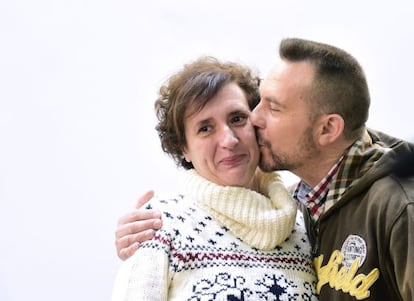“I don’t know what went wrong, or if anything went wrong”
Nursing assistant who contracted Ebola speaks after doctors discharge her Medical team admits they can’t pinpoint what cured Teresa Romero

The Spanish nursing assistant who became the first person outside of West Africa to contract Ebola appeared before the press on Wednesday morning after being discharged from hospital. After more than a month of treatment, Teresa Romero has been given the definitive all-clear by her medical team.
An emotional but at all times in control Romero appeared before a press scrum at Carlos III Hospital in Madrid, where she spent nearly the whole of October in isolation. Also present at the press conference was her husband Javier Limón.
“I’m here to give you my thanks, but I’m still very weak,” Romero said, before reading a statement in which she thanked her doctors, her family and the public for their messages and letters of support.
“I don’t know what went wrong,” she said in reference to her infection. “I don’t even know if something did go wrong. All I know is that I’m not bitter and I’m not blaming anyone.”
Romero was part of the medical team at Carlos III Hospital who treated two Spanish missionaries who had been repatriated from western Africa after contracting Ebola. It is still not known exactly how she became infected with the virus.
The 44-year-old also requested to be “left in peace” as she continues her recovery, and said that she hoped her contagion had “served some purpose” with regard to “research of the disease.” “If my blood can be used to cure other people, here I am,” she said, her statements prompting regular outbreaks of applause.
Part of Romero’s treatment involved transfusions of blood plasma taken from a missionary who had survived the virus, to whom she also offered thanks.
After concluding her brief statement, her husband Javier Limón continued to speak on her behalf, reading a text prepared by Romero regarding their dog, Excalibur. The pet was put down by regional authorities because of the risk that it may have been infected with Ebola, despite conflicting medical opinions as to whether that was possible, and an international outcry among animal rights groups and the general public over the decision.
Limón criticized the decision to destroy the pet, pointing out that the dog of an Ebola victim in the United States was not destroyed, and has since been reunited with its owner.
“Complicated month for everyone”
The doctors who treated Romero at Carlos III spoke earlier on Wednesday morning of her “great professionalism” and the interest she took in the more than 100 medical staff who took care of her. During a press conference, the general director of the hospital, Rafael Pérez-Santamarina, celebrated the “great news” that Romero’s release from care represented, after a “complicated month for everyone.”
José Ramón Arribas, the head of the infectious diseases unit, stressed the fact that the 44-year-old nursing assistant was being released with “no risk of contagion.” She can, he continued, “lead a perfectly normal life,” but underlined that she had not entirely recovered from her ordeal. “We need to give her time so that she can completely recover from such a dramatic event,” he said.
The specialist went on to explain that the treatment of the patient had provided the doctors with some “very important lessons.” Arribas confirmed that Romero was treated with the antiviral drug Favipiravir and serum from a cured patient.
But another member of the team, Doctor Marta Arsuaga, explained that it was difficult to pinpoint exactly which treatment had worked in the case of Romero, and stressed that her immune system had “a lot to do” with her recovery. “We cannot say what has cured Teresa,” she concluded.
Tu suscripción se está usando en otro dispositivo
¿Quieres añadir otro usuario a tu suscripción?
Si continúas leyendo en este dispositivo, no se podrá leer en el otro.
FlechaTu suscripción se está usando en otro dispositivo y solo puedes acceder a EL PAÍS desde un dispositivo a la vez.
Si quieres compartir tu cuenta, cambia tu suscripción a la modalidad Premium, así podrás añadir otro usuario. Cada uno accederá con su propia cuenta de email, lo que os permitirá personalizar vuestra experiencia en EL PAÍS.
¿Tienes una suscripción de empresa? Accede aquí para contratar más cuentas.
En el caso de no saber quién está usando tu cuenta, te recomendamos cambiar tu contraseña aquí.
Si decides continuar compartiendo tu cuenta, este mensaje se mostrará en tu dispositivo y en el de la otra persona que está usando tu cuenta de forma indefinida, afectando a tu experiencia de lectura. Puedes consultar aquí los términos y condiciones de la suscripción digital.








































